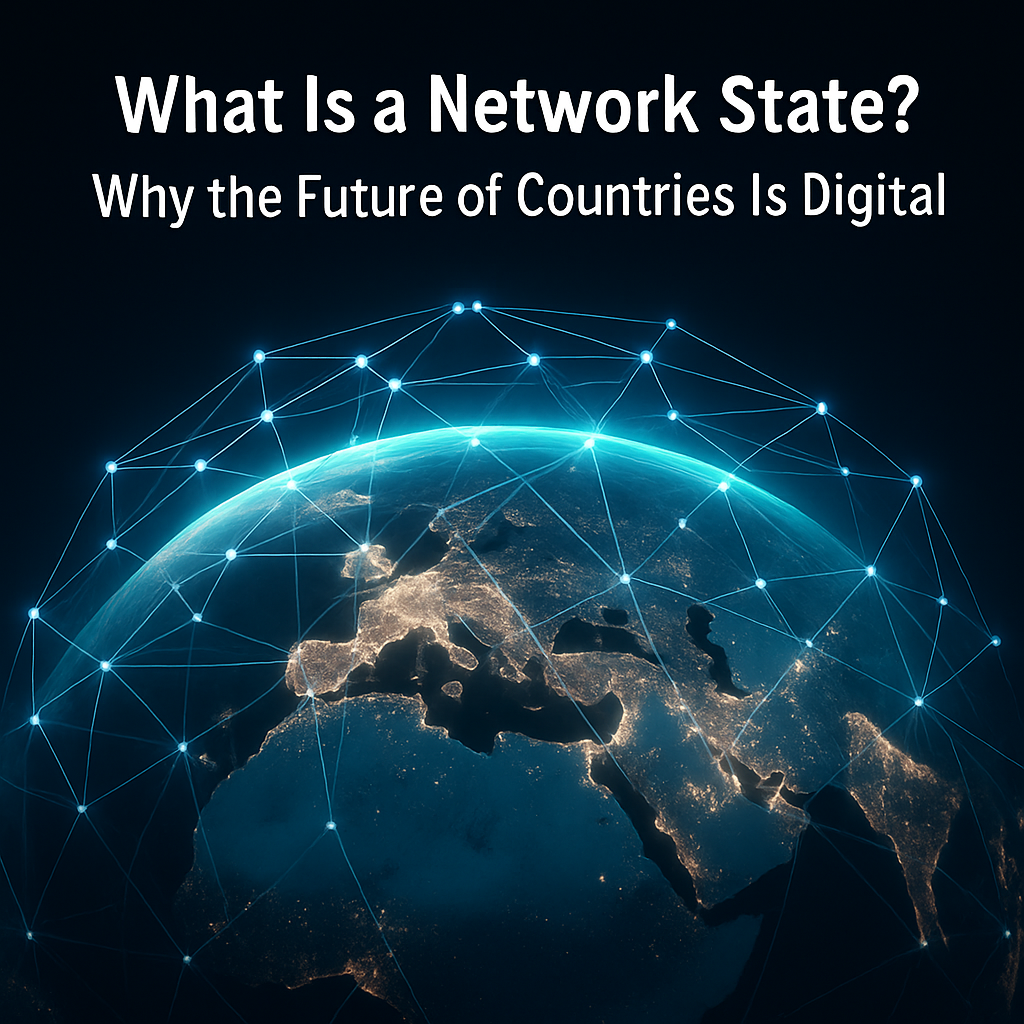
Remember when nations were defined by borders, flags, and bad national anthems?
Cute.
That model is cracking — not with a bang, but with a bandwidth.
Welcome to the age of Network States — where the most powerful nations of the future may not own land, but they’ll own your data, your dollars, and your digital identity.
Let’s unpack it, slowly, like a passport stamped with zeros and dreams.
What the Hell Is a Network State?
A Network State is a community of aligned individuals, bound not by geography, but by values, tech stacks, and shared purpose — who eventually acquire physical territory, or don’t even bother.
Think:
- A borderless nation built in the cloud
- A Discord server that raised a defense budget
- A sovereign community with shared bank accounts, citizenship NFTs, and an exit strategy
The term was popularized by Balaji Srinivasan, but the roots run deeper:
Crypto tribes, sovereign individuals, digital nomads, parallel societies — Network States are the logical endpoint of people opting out of legacy systems and building new ones without asking permission.
Why Are They Emerging Now?
Because traditional nation-states are bloated, slow, and allergic to innovation.
Try opening a bank account across borders.
Try voting meaningfully in a two-party puppet show.
Try living your life without getting milked by inflation, surveillance, and arbitrary border policy.
Spoiler: The state is failing at everything — except taking more of your money.
Meanwhile, technology is enabling us to organize, transact, and govern in new ways:
- Bitcoin made trustless money real
- Ethereum made contracts programmable
- DAOs let strangers coordinate like corporations
- Remote work made geography optional
- AI now helps govern faster than politicians can pronounce “sovereign”
Why cling to an obsolete 20th-century structure when you can fork reality?
What Do Network States Look Like?
They don’t look like anything you’re used to — and that’s the point.
They may start as:
- A Telegram group with a shared mission
- A tokenized community with collective funding
- A digital economy with its own stablecoin
- An on-chain constitution ratified by holders
And they evolve into:
- A social graph with shared rules
- A treasury with shared capital
- A physical footprint (maybe) with shared territory or intentional enclaves
Think startup nation meets medieval order meets sci-fi governance.
Yes, it sounds insane — until you realize your current nation is also insane, just in slow motion.
Wait… Are You Saying Countries Are Optional Now?
Not today.
But increasingly — yes.
Your country isn’t a god.
It’s just a user interface.
If it fails to protect you, represent you, or even function coherently, the rational move isn’t protest. It’s exit.
And in a world where citizenship, identity, money, and community can be digital-first, the cost of exit is dropping fast.
That’s what scares governments.
That’s what empowers Network States.
Will Network States Replace Traditional Countries?
Maybe not all — but some? Absolutely.
Network States don’t have to conquer.
They just need to compete — and outperform.
Offer better governance, lower taxes, better security, greater freedom — and people will opt in.
Just like users switch apps.
Just like investors switch protocols.
Just like talent switches platforms.
And when enough people stop believing in the old gods of borders and bureaucracy, the new gods of code and consensus take over.
Final Thought: You Are Not a Citizen. You Are a Node.
You don’t have to live in a system you didn’t choose.
You don’t have to fund wars you never voted for.
You don’t have to obey laws written by relics.
You can live by opt-in governance, participate in voluntary economies, and build parallel societies that run on code, not coercion.
You’re not stuck.
You’re just early.
The Network State isn’t coming.
It’s already here.
Quiet. Fractal. Borderless.
And if you’re reading this —
you’re probably part of it already.